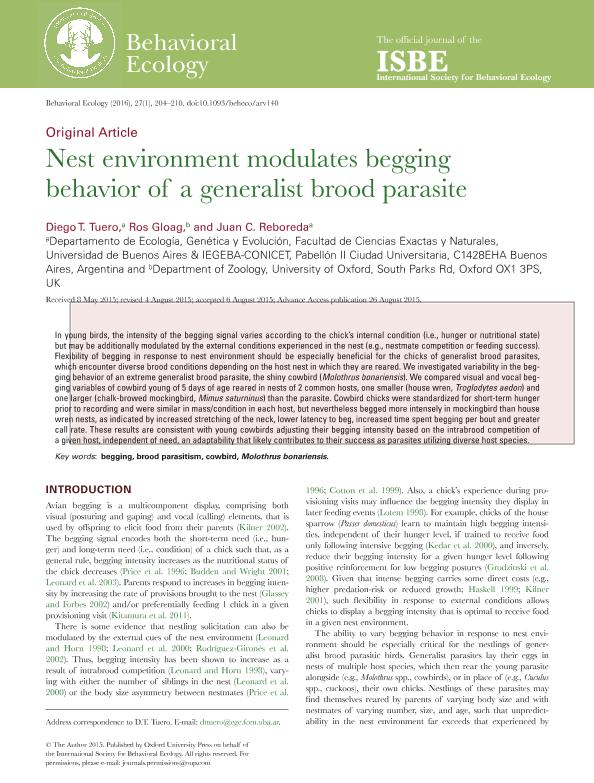Mostrar el registro sencillo del ítem
dc.contributor.author
Tuero, Diego Tomas

dc.contributor.author
Gloag, Ros

dc.contributor.author
Reboreda, Juan Carlos

dc.date.available
2018-10-01T19:35:36Z
dc.date.issued
2016-07
dc.identifier.citation
Tuero, Diego Tomas; Gloag, Ros; Reboreda, Juan Carlos; Nest environment modulates begging behavior of a generalist brood parasite; Oxford Univ Press Inc; Behavioral Ecology; 27; 1; 7-2016; 204-210
dc.identifier.issn
1045-2249
dc.identifier.uri
http://hdl.handle.net/11336/61433
dc.description.abstract
In young birds, the intensity of the begging signal varies according to the chick's internal condition (i.e., hunger or nutritional state) but may be additionally modulated by the external conditions experienced in the nest (e.g., nestmate competition or feeding success). Flexibility of begging in response to nest environment should be especially beneficial for the chicks of generalist brood parasites, which encounter diverse brood conditions depending on the host nest in which they are reared. We investigated variability in the begging behavior of an extreme generalist brood parasite, the shiny cowbird (Molothrus bonariensis). We compared visual and vocal begging variables of cowbird young of 5 days of age reared in nests of 2 common hosts, one smaller (house wren, Troglodytes aedon) and one larger (chalk-browed mockingbird, Mimus saturninus) than the parasite. Cowbird chicks were standardized for short-term hunger prior to recording and were similar in mass/condition in each host, but nevertheless begged more intensely in mockingbird than house wren nests, as indicated by increased stretching of the neck, lower latency to beg, increased time spent begging per bout and greater call rate. These results are consistent with young cowbirds adjusting their begging intensity based on the intrabrood competition of a given host, independent of need, an adaptability that likely contributes to their success as parasites utilizing diverse host species.
dc.format
application/pdf
dc.language.iso
eng
dc.publisher
Oxford Univ Press Inc

dc.rights
info:eu-repo/semantics/openAccess
dc.rights.uri
https://creativecommons.org/licenses/by-nc-sa/2.5/ar/
dc.subject
Begging
dc.subject
Brood Parasitism
dc.subject
Cowbird
dc.subject
Molothrus Bonariensis
dc.subject.classification
Otras Ciencias Biológicas

dc.subject.classification
Ciencias Biológicas

dc.subject.classification
CIENCIAS NATURALES Y EXACTAS

dc.title
Nest environment modulates begging behavior of a generalist brood parasite
dc.type
info:eu-repo/semantics/article
dc.type
info:ar-repo/semantics/artículo
dc.type
info:eu-repo/semantics/publishedVersion
dc.date.updated
2018-10-01T16:11:40Z
dc.journal.volume
27
dc.journal.number
1
dc.journal.pagination
204-210
dc.journal.pais
Reino Unido

dc.journal.ciudad
Oxford
dc.description.fil
Fil: Tuero, Diego Tomas. Consejo Nacional de Investigaciones Científicas y Técnicas. Oficina de Coordinación Administrativa Ciudad Universitaria. Instituto de Ecología, Genética y Evolución de Buenos Aires. Universidad de Buenos Aires. Facultad de Ciencias Exactas y Naturales. Instituto de Ecología, Genética y Evolución de Buenos Aires; Argentina
dc.description.fil
Fil: Gloag, Ros. University of Oxford; Reino Unido
dc.description.fil
Fil: Reboreda, Juan Carlos. Consejo Nacional de Investigaciones Científicas y Técnicas. Oficina de Coordinación Administrativa Ciudad Universitaria. Instituto de Ecología, Genética y Evolución de Buenos Aires. Universidad de Buenos Aires. Facultad de Ciencias Exactas y Naturales. Instituto de Ecología, Genética y Evolución de Buenos Aires; Argentina
dc.journal.title
Behavioral Ecology

dc.relation.alternativeid
info:eu-repo/semantics/altIdentifier/doi/http://dx.doi.org/10.1093/beheco/arv140
dc.relation.alternativeid
info:eu-repo/semantics/altIdentifier/url/https://academic.oup.com/beheco/article/27/1/204/1744358
Archivos asociados
